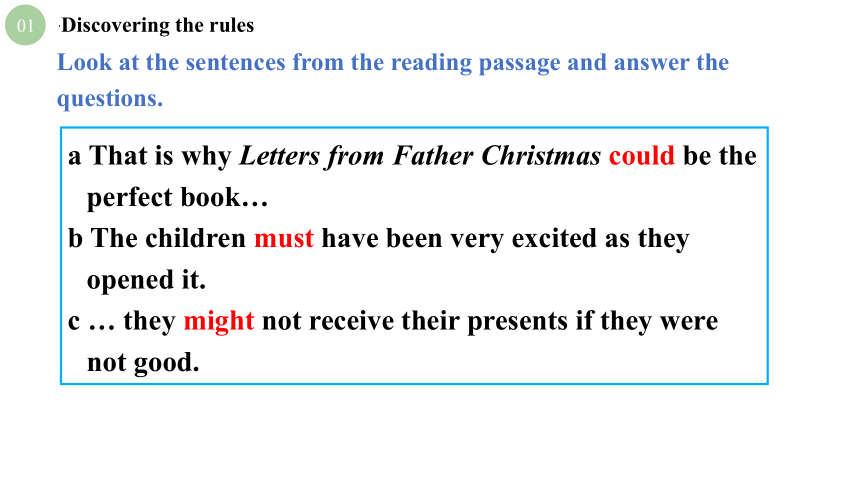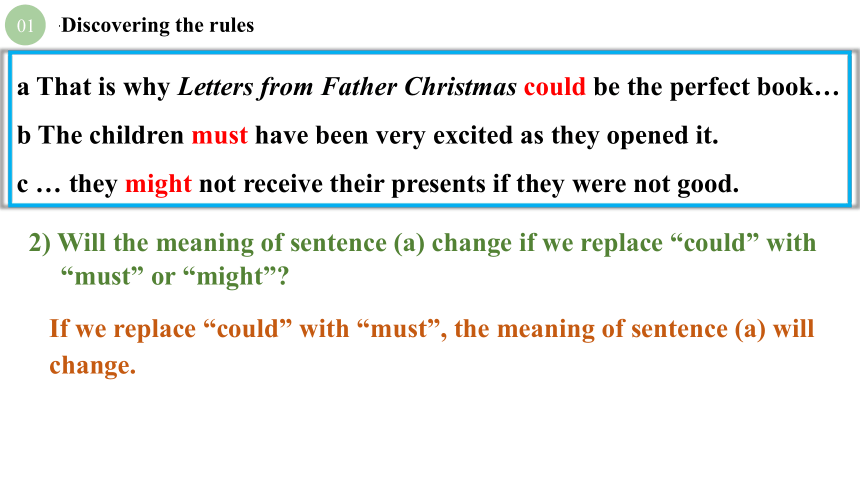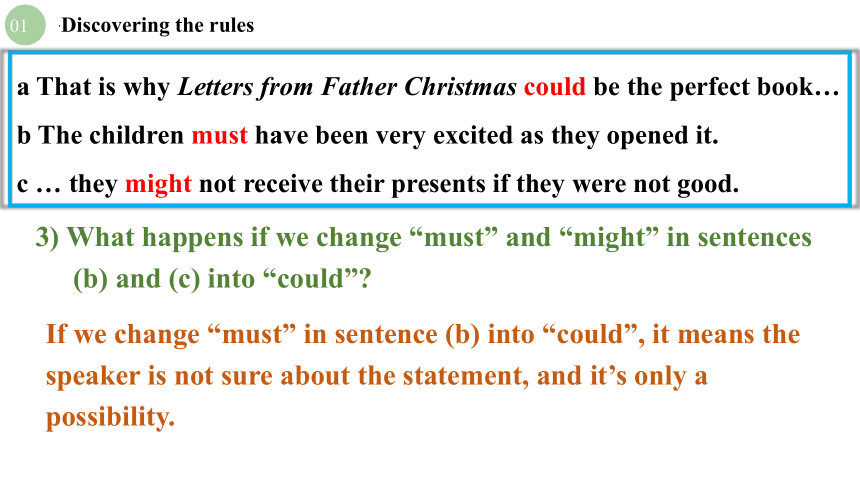外研版(2019)必修第二册 Unit 2 Let's celebrate Using language 情态动词课件(25张PPT)
文档属性
| 名称 | 外研版(2019)必修第二册 Unit 2 Let's celebrate Using language 情态动词课件(25张PPT) |

|
|
| 格式 | pptx | ||
| 文件大小 | 1.0MB | ||
| 资源类型 | 教案 | ||
| 版本资源 | 外研版(2019) | ||
| 科目 | 英语 | ||
| 更新时间 | 2023-03-22 11:52:52 | ||
图片预览









文档简介
(共25张PPT)
Unit 2
Let’s celebrate
Modals (2)
回归第1单元学习的情态动词
can, could
must, have
be able to
dare
need
Look at the sentences from the reading passage and answer the questions.
a That is why Letters from Father Christmas could be the perfect book…
b The children must have been very excited as they opened it.
c … they might not receive their presents if they were not good.
01
Discovering the rules
1) What do the words in red indicate: an order, a request, ability or possibility
The words in red indicate possibility.
v. 表明, 显示
n. 请求, 要求
a That is why Letters from Father Christmas could be the perfect book…
b The children must have been very excited as they opened it.
c … they might not receive their presents if they were not good.
01
Discovering the rules
2) Will the meaning of sentence (a) change if we replace “could” with “must” or “might”
If we replace “could” with “must”, the meaning of sentence (a) will change.
a That is why Letters from Father Christmas could be the perfect book…
b The children must have been very excited as they opened it.
c … they might not receive their presents if they were not good.
01
Discovering the rules
3) What happens if we change “must” and “might” in sentences (b) and (c) into “could”
If we change “must” in sentence (b) into “could”, it means the speaker is not sure about the statement, and it’s only a possibility.
a That is why Letters from Father Christmas could be the perfect book…
b The children must have been very excited as they opened it.
c … they might not receive their presents if they were not good.
01
Discovering the rules
情态动词must, can/could, may/might均可表示推测, 它们可以对过去、现在或将来的情况作出语气强弱不同的推测。
1. 表示肯定的推测时:
各情态动词语气从弱到强依次为
might → may → could → can → must;
把握推测语气的特点,选择恰当的情态动词。
02
Studying the rules
表示否定的推测时:
can’t / couldn’t语气较强,意为“不可能”;may not / might not语气较弱,意为“可能不”。
must的否定形式mustn’t不表示否定推测,而是表示“不许可”或“不应该”。
02
Studying the rules
1. 用于肯定句,表示客观可能性,意为“可能”,即从理论上看是可能的,但不一定会发生
As a human being, anyone can make a mistake.
作为人类,任何人都有可能犯错。
2.用于否定句或疑问句,表示对现在的动作或状态进行主观的猜测,意为“可能”,或表示惊异、怀疑等态度。
a. He can't have a lot of money. 他不可能有很多钱。
b. Can it be that it was l who was mistaken
难道是我弄错了
Grammar 1 can+动词原形表推测
could+动词原形,意为“可能”,可以指过去的情况,也可以指现在的情况,语气缓和。多用于否定句或疑问句。
a. He looks young. He couldn't be over 50.
他看起来很年轻,不可能超过50岁。
b. Could it be true 那可能是真的吗
Grammar 2 could+动词原形表推测
1. 表示主观的推测,意为“或许”,用于肯定句和否定句均可。
a. He may be very busy now. 他现在可能很忙。
b. He may not be at home. 他可能不在家。
注意:表示可能性时,can't语气较强,表示“不可能”;
may not语气较弱;表示“可能不,或许不”。
Grammar 3 may+动词原形表推测
might+动词原形,表示推测,意为“可能",可以指过去的情况,也可以指现在的情况,但语气比may更加不肯定。用于肯定句或否定句均可。
a. They might have a lot of work to do now but I'm not sure.
他们现在可能有很多活儿要干,不过我不确定。
b. She was afraid they might not like the idea.
她担心他们可能不喜欢这个想法。
Grammar 4 might+动词原形表推测
must+动词原形,表示猜测,意为“准是,一定”,通常用于肯定句。
a. This must be your room. 这一定是你的房间。
b. Look at his new car. He must have a lot of money.
瞧他那辆新车。他肯定很有钱。
Grammar 5 must+动词原形表推测
课堂小练
选词填空(包含否定式)
can, could, may, might, must (可重复选)
1.Helen go on a trip with us, but she isn’t quite sure.
2.My sister met him at the theatre last night, so he have atteneded your lecture.
3.-I am sure I saw Brian in the park this morning.
- You be imagining things. He left for America last night.
4. We have face the diffculty together, but why didn’t you tell me
5.If you _______ smoke, please go outside.
may/might
can’t/ couldn’t
must
must
could
(At a fancy dress party)
Chris: I spent ages putting up all the balloons and flowers last night.
Jean: I expect you are feeling tired now!
Chris: Yes, I am. Look that guy is dressed as Batman. Is that Mike
Jean: It’s possibly him. Check out that girl over there.
I’m sure that’s Lucy.
You must be tired now!
It may/might/could be him.
That must be Lucy!
Rewrite the underlined sentences in the conversation using can/could, may/might and must.
Chris: No, I don’t think that’s Lucy. Lucy isn’t that tall.
Jean: Look at those two guys dressed as chickens!
Oh, they’re waving at us!
Maybe they’re from our school.
Chris: Let’s go and find out.
that can’t be Lucy!
They may/might/could be from our school.
Rewrite the underlined sentences in the conversation using can/could, may/might and must.
Look at the picture and make as many sentences as possible using can/could, may/might and must.
The woman in red must be very excited to buy so many things.
The man with a wallet in his hand might be a bit reluctant to pay.
The woman in glasses may be very tired to get up so early and carry so many bags.
The cashier might be feeling uncomfortable as he is sweating a lot.
…
1. can+完成式,表示对已发生情况的推测,主要用于否定句或疑问句。
a. You can't have forgotten her. 你不可能已经忘记她了。
b. Where can she have put it 她到底把它放在哪儿了呢
2. could+完成式,表示对过去情况的推测,多用于否定句或疑问句。
a. He could not have been more than 16 at that time. 他当时不可能超过16岁。
b Could she have forgotten my address 她会忘记我的地址吗
Grammar 6 情态动词+完成式的用法
3. may/ might+完成式,表示对已发生事情的不肯定的推测,mght相比may语气更加不肯定。
He may / might have come by train. 他可能是坐火车来的。
4. must+完成式,表示对已发生情况的推测,通常用于肯定句。
She must have gone home. 她肯定已经回家了。
Grammar 6 情态动词+完成式的用法
情态动词表推测
1. He is right.
2. He must be right.
3. He will be right.
4. He would be right.
5. He ought to be right.
6. He should be right.
7. He may be right.
8. He could be right.
9. He might be right.
certain
almost certain
uncertain
真题链接
1. (2021 天津6月卷) -I honestly don’t think I'm going to be admitted.
-Well, you never know! You__________ a better impression than you think.
A. may have made B. should have made
C. couldn't have made D. needn't have made
2. (江苏巻) -I left my handbag on the train, but luckily someone gave it to a railway official.
-How unbelievable to get it back! I mean, someone__________it.
A. will have stolen B. might have stolen
C. should have stolen D. must have stolen
A
B
真题链接
3. (江苏巻改编) It was sad to me that they, so poor themselves, ______bring me food.
A. can B. should
C. must D. need
B
课堂小练
1. —I don’t really like James. Why did you invite him
— Don’t worry. He ______ come. He said he wasn’t certain what his plans were.
A. must not B. need not C. would not D. might not
2. The traffic is heavy these days. I _____arrive a bit late, so could you save me a place
A. can B. must C. need D. might
3. One of the few things you _____say about English people with certainty is that they talk a lot about the weather.
A. need B. must C. should D. can
D
D
D
Thank you!
Unit 2
Let’s celebrate
Modals (2)
回归第1单元学习的情态动词
can, could
must, have
be able to
dare
need
Look at the sentences from the reading passage and answer the questions.
a That is why Letters from Father Christmas could be the perfect book…
b The children must have been very excited as they opened it.
c … they might not receive their presents if they were not good.
01
Discovering the rules
1) What do the words in red indicate: an order, a request, ability or possibility
The words in red indicate possibility.
v. 表明, 显示
n. 请求, 要求
a That is why Letters from Father Christmas could be the perfect book…
b The children must have been very excited as they opened it.
c … they might not receive their presents if they were not good.
01
Discovering the rules
2) Will the meaning of sentence (a) change if we replace “could” with “must” or “might”
If we replace “could” with “must”, the meaning of sentence (a) will change.
a That is why Letters from Father Christmas could be the perfect book…
b The children must have been very excited as they opened it.
c … they might not receive their presents if they were not good.
01
Discovering the rules
3) What happens if we change “must” and “might” in sentences (b) and (c) into “could”
If we change “must” in sentence (b) into “could”, it means the speaker is not sure about the statement, and it’s only a possibility.
a That is why Letters from Father Christmas could be the perfect book…
b The children must have been very excited as they opened it.
c … they might not receive their presents if they were not good.
01
Discovering the rules
情态动词must, can/could, may/might均可表示推测, 它们可以对过去、现在或将来的情况作出语气强弱不同的推测。
1. 表示肯定的推测时:
各情态动词语气从弱到强依次为
might → may → could → can → must;
把握推测语气的特点,选择恰当的情态动词。
02
Studying the rules
表示否定的推测时:
can’t / couldn’t语气较强,意为“不可能”;may not / might not语气较弱,意为“可能不”。
must的否定形式mustn’t不表示否定推测,而是表示“不许可”或“不应该”。
02
Studying the rules
1. 用于肯定句,表示客观可能性,意为“可能”,即从理论上看是可能的,但不一定会发生
As a human being, anyone can make a mistake.
作为人类,任何人都有可能犯错。
2.用于否定句或疑问句,表示对现在的动作或状态进行主观的猜测,意为“可能”,或表示惊异、怀疑等态度。
a. He can't have a lot of money. 他不可能有很多钱。
b. Can it be that it was l who was mistaken
难道是我弄错了
Grammar 1 can+动词原形表推测
could+动词原形,意为“可能”,可以指过去的情况,也可以指现在的情况,语气缓和。多用于否定句或疑问句。
a. He looks young. He couldn't be over 50.
他看起来很年轻,不可能超过50岁。
b. Could it be true 那可能是真的吗
Grammar 2 could+动词原形表推测
1. 表示主观的推测,意为“或许”,用于肯定句和否定句均可。
a. He may be very busy now. 他现在可能很忙。
b. He may not be at home. 他可能不在家。
注意:表示可能性时,can't语气较强,表示“不可能”;
may not语气较弱;表示“可能不,或许不”。
Grammar 3 may+动词原形表推测
might+动词原形,表示推测,意为“可能",可以指过去的情况,也可以指现在的情况,但语气比may更加不肯定。用于肯定句或否定句均可。
a. They might have a lot of work to do now but I'm not sure.
他们现在可能有很多活儿要干,不过我不确定。
b. She was afraid they might not like the idea.
她担心他们可能不喜欢这个想法。
Grammar 4 might+动词原形表推测
must+动词原形,表示猜测,意为“准是,一定”,通常用于肯定句。
a. This must be your room. 这一定是你的房间。
b. Look at his new car. He must have a lot of money.
瞧他那辆新车。他肯定很有钱。
Grammar 5 must+动词原形表推测
课堂小练
选词填空(包含否定式)
can, could, may, might, must (可重复选)
1.Helen go on a trip with us, but she isn’t quite sure.
2.My sister met him at the theatre last night, so he have atteneded your lecture.
3.-I am sure I saw Brian in the park this morning.
- You be imagining things. He left for America last night.
4. We have face the diffculty together, but why didn’t you tell me
5.If you _______ smoke, please go outside.
may/might
can’t/ couldn’t
must
must
could
(At a fancy dress party)
Chris: I spent ages putting up all the balloons and flowers last night.
Jean: I expect you are feeling tired now!
Chris: Yes, I am. Look that guy is dressed as Batman. Is that Mike
Jean: It’s possibly him. Check out that girl over there.
I’m sure that’s Lucy.
You must be tired now!
It may/might/could be him.
That must be Lucy!
Rewrite the underlined sentences in the conversation using can/could, may/might and must.
Chris: No, I don’t think that’s Lucy. Lucy isn’t that tall.
Jean: Look at those two guys dressed as chickens!
Oh, they’re waving at us!
Maybe they’re from our school.
Chris: Let’s go and find out.
that can’t be Lucy!
They may/might/could be from our school.
Rewrite the underlined sentences in the conversation using can/could, may/might and must.
Look at the picture and make as many sentences as possible using can/could, may/might and must.
The woman in red must be very excited to buy so many things.
The man with a wallet in his hand might be a bit reluctant to pay.
The woman in glasses may be very tired to get up so early and carry so many bags.
The cashier might be feeling uncomfortable as he is sweating a lot.
…
1. can+完成式,表示对已发生情况的推测,主要用于否定句或疑问句。
a. You can't have forgotten her. 你不可能已经忘记她了。
b. Where can she have put it 她到底把它放在哪儿了呢
2. could+完成式,表示对过去情况的推测,多用于否定句或疑问句。
a. He could not have been more than 16 at that time. 他当时不可能超过16岁。
b Could she have forgotten my address 她会忘记我的地址吗
Grammar 6 情态动词+完成式的用法
3. may/ might+完成式,表示对已发生事情的不肯定的推测,mght相比may语气更加不肯定。
He may / might have come by train. 他可能是坐火车来的。
4. must+完成式,表示对已发生情况的推测,通常用于肯定句。
She must have gone home. 她肯定已经回家了。
Grammar 6 情态动词+完成式的用法
情态动词表推测
1. He is right.
2. He must be right.
3. He will be right.
4. He would be right.
5. He ought to be right.
6. He should be right.
7. He may be right.
8. He could be right.
9. He might be right.
certain
almost certain
uncertain
真题链接
1. (2021 天津6月卷) -I honestly don’t think I'm going to be admitted.
-Well, you never know! You__________ a better impression than you think.
A. may have made B. should have made
C. couldn't have made D. needn't have made
2. (江苏巻) -I left my handbag on the train, but luckily someone gave it to a railway official.
-How unbelievable to get it back! I mean, someone__________it.
A. will have stolen B. might have stolen
C. should have stolen D. must have stolen
A
B
真题链接
3. (江苏巻改编) It was sad to me that they, so poor themselves, ______bring me food.
A. can B. should
C. must D. need
B
课堂小练
1. —I don’t really like James. Why did you invite him
— Don’t worry. He ______ come. He said he wasn’t certain what his plans were.
A. must not B. need not C. would not D. might not
2. The traffic is heavy these days. I _____arrive a bit late, so could you save me a place
A. can B. must C. need D. might
3. One of the few things you _____say about English people with certainty is that they talk a lot about the weather.
A. need B. must C. should D. can
D
D
D
Thank you!
